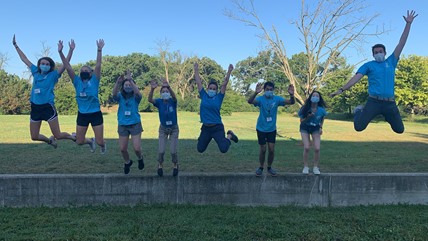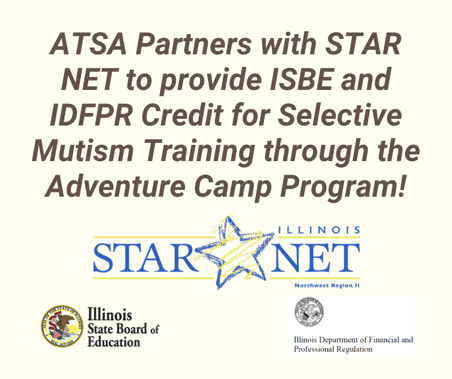Become an Adventure Camp Counselor!
Free Training in Selective Mutism Intervention
If you are an educator or a health provider, you can earn 12.5 ISBE or IDFPR credits through ATSA's Adventure Camp program for children with selective mutism. This short-term program is ideal for those looking to gain time-limited hands-on training in working with a student with selective mutism. Join ATSA in our cause to spread awareness and address limited resources for those coping with selective mutism.
How to Apply
Submit the following:
- Cover letter stating your interest, relevant skills, and why you are a good candidate for this free training
- CV or Resume
- 2 letters of recommendation, with "Recommendation for [Name]" in the subject line
Accepting rolling applications until all slots fill.
Looking for our 12-mo Practicum?
What to Expect
The training begins with a two-day didactics seminar typically held the third weekend in June, followed by supervised delivery of the Adventure Camp protocol scheduled over several days in July, and ending with participating in the five-day Adventure Camp intensive group treatment for children with selective mutism the first week of August. In the didactics portion, counselors learn about theory, research, and practice of working with children coping with selective mutism. During the implementation of the Adventure Camp protocol and camp week, counselors learn how to apply what they’ve learned via hands-on delivery of specific skills. These include shaping, fading, modeling, systematic desensitization, and differential contingent reinforcement for treating selective mutism. Under the supervision of licensed clinical psychologist, Carmen Tumialan Lynas, Ph.D., the 5-day camp week involves pairing each camper with a counselor who coaches their assigned camper through the exposure tasks of the day.
Adventure Camp is held in a school and simulates school-like activities such as morning meeting, show and tell, recess, and bus rides to field trips in the community. On field trips, campers continue generalizing speaking behaviors across people and activities in the community. Their one-on-one counselor is with them every step of the way, continuously reinforcing them with points and labeled praise for interacting verbally. At the end of the day, the campers are rewarded for their hard work at the Prize Store.
Having Adventure Camp in August increases the likelihood that the exposure therapy treatment gains carry over into school, setting the stage for a successful school year. Through participation in the training and camp, not only do counselors learn about selective mutism, but they also play a part in changing a child’s life forever and are changed themselves through the knowledge they have gained at Adventure Camp.
Why We Do What We Do
The general public’s current knowledge about selective mutism is lacking and ATSA's goal is to bring awareness to the public not just about selective mutism, but about anxiety-related conditions and other conditions that can interfere with a child’s development and learning. When Adventure Camp is over, the learning and improving never stops; it continues through every interaction that counselors have in their professional lives. When counselors return to their work places, they have the opportunity to share information with their colleagues and shed light on a poorly understood condition, which is in line with ATSA’s mission to spread awareness and education about selective mutism.
Join us in our mission! Apply today!
Selective Mutism
Selective mutism is an inability to speak where speaking is expected (e.g., school) despite the ability to speak (e.g., at home). It affects approximately 1 in 140 children, though some experts believe the prevalence may be higher. It is considered an anxiety disorder, and similar to a phobia, selective mutism is treated with exposure therapy during which the individual approaches their fear of speaking in graduated, successive steps. Adventure Camp aims to provide the student with exposure therapy in a school simulated setting, extinguish their fear of speaking in school, with the goal of carrying over the treatment effects to their actual school.
Training Timeline:
- June (usually the third weekend): Attend a 2-Day seminar to learn the AC Protocol.
- July (usually the last three weeks): Complete an estimate of 5 Lead-In sessions scheduled within this time frame.
- First week of August: Adventure Camp runs M-F, 9am-3pm (Counselors attend 8am-4pm)
AC Counselors from 2011 share their experience
We've grown since then!
Learn more about Adventure Camp
Information for Local Counselors
Information for Out-of-Town Counselors
Click here to download the Recruitment Flyer
How to Apply
Submit the following:
- Cover letter stating your interest, relevant skills, and why you are a good candidate for this free training
- CV or Resume
- 2 letters of recommendation, with "Recommendation for [Name]" in the subject line
Accepting rolling applications until all slots fill.
See who previous AC Counselors have been!
Read Adventure Camp Counselor Bios dating back to our very first camp in 2011.
Read Adventure Camp Counselor Bios
